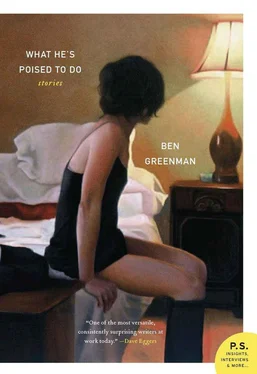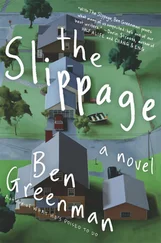“That’s it,” you said, and got into a taxicab. The evening had begun light and ended with a thud. I went home. I slipped into bed. My wife was there, which was a rarity those days. Her work must have ended early. She slid back toward me. It was warm in the bed. That was where I belonged, and I told myself that until I believed it.
Dear X,
After I insulted you by insulting your new lover, after you stormed off to your taxicab, you disappeared. You wouldn’t answer my phone calls. I grew afraid that we would never speak again, and my fear drove me into irrational behavior. I dialed six digits of your phone number and hung up. I wrote your name on a piece of paper, over and over again, as if that might summon you. I went to the apartment where we had met, which was vacant again — the gay couple had decided to move to the suburbs and adopt a baby — and I sat in the middle of the floor and I thought I might cry. Then I went home, and went to bed with my wife, and never stopped thinking about you. Time passed like that for a while. Then, one day, there was a birthday party for a mutual friend. The guest of honor was a woman who was known both for her superb taste in contemporary art and for the massive fortune she had inherited from her father, who had founded the nation’s largest manufacturer of railway machinery. Her gallery was called, in tribute, Stacker. I asked my wife to go to the party, but she said she’d be at the office late. “I’ll probably be home early,” I said. “I get tired when I’m at parties without you. I feel weakened.”
“Etiolated,” she said. “There’s a word for it.”
I went to the party, thrilled to think I might see you. I started talking to a woman who owned a small gallery. You came up behind me and dug a fingernail into my side. “Hi,” you said.
“Ow,” I said.
“Louis is here,” you said.
“Louis?”
“The guy from California.” I was being tested. I had failed before, so I chose to pass. You introduced me as a friend and a collector. I shook Louis’s hand. “Nice to meet you,” I said.
“I don’t know anything about art,” he said. “All of it looks good to me, or bad, depending on my mood. I can’t tell if there’s any real good or bad in it.”
You excused yourself to go to the ladies’ room. “She’s been talking about you for the last few months,” I said. “She seems thrilled to see you.” I did not see the harm in supporting him. I doubted he would last, but I could not see the point of contributing to his demise. How would that work to my advantage?
When he got up to get more drinks, you finished your wine with exaggerated quickness. “I was thinking maybe I would break up with him this weekend,” you said. “Or maybe not.” It is not an exaggeration to say that you were happier than I had ever seen you. Nor is it an exaggeration to say that you were incomplete without your sadness.
“I thought we weren’t talking about those things anymore,” I said.
“You’re right. Not allowed. If we follow the rules, there’s some chance we might not grow to hate each other.”
The birthday girl floated by, and I went to speak with her. From the corner of my eye, I watched you and Louis. He handed you your wine. You put your head on his shoulder. His hand went to your head. Your face, which I had looked upon hundreds of times with something more than hope, disappeared inside the crook of his arm. I think his hands were between your knees. I was about to come back and sit, but the two of you stood. You walked up to me, smiling. “We’re going to head home,” you said.
“Nice to meet you,” Louis said.
The next person I spoke to was…. I cannot remember. Some young woman with a story about how her libido was the brightest color on the broader canvas of her life, I’m guessing. I was not feeling rage or sorrow or loss. I was feeling maturity. I had watched a man claim you, and I had thought mainly of your happiness and how you might truly secure it. My sense of things curdled into superiority and then drained away entirely. “Good-bye,” I said to the young woman I was probably talking to.
On the walk home, it occurred to me that I might be married forever, to the same woman, that we might have an endless series of ups and downs, that they might be a condition of our existence, in the way the sea is the condition of a boat’s existence. I thought about you at home, in your apartment, undressing for your visitor. Would he stand looking at your paintings rather than at you? That would be a wonderfully modest evasion, almost strategic.
My wife was not home when I arrived. I poured myself a drink and sat up waiting for her, paging through a Blood-Horse magazine. Something was wrong with the magazine. The pages were printed with a poorer quality of ink. The horses looked sickly. Something had tainted the finest bloodlines. I put the magazine away and took out the dictionary. I was looking for a word that described what I was feeling. I had no intention of using it. I just needed to know. And I needed to find it on my own. There was no asking my wife. There was no asking anyone anything anymore.

Dear Isabel,
You have no doubt seen, and perhaps even read, the new history of warfare that is all the rage with the fashionably intelligent among today’s youth. I figure in that book. In the section on advances in muzzle-loaded ammunition, the book describes me as a codeveloper, with Delvigne, of the Minié ball. This strikes me as something of a joke. Do the authors of this wretched tome really think that Delvigne did anything other than drink too much wine and sleep late and run his hands up under nurses’ skirts while whistling Méhul? The man was a riot of mustache and dirty shirts. I wish they would not malign me by comparing my contribution with his. I was pleased to be his brother-in-arms and to be his tentmate and to be his dinner companion and to be his sympathetic ear, but I will never be his equal. Rather: he will never be mine.
I am sorry, Isabel. I send you only a single letter each year, and I have already let my distemper get the best of me. Let me be more measured in my comments. Delvigne was not a brainless heap of skin, bones, and blood. He did contribute to the invention of the Minié ball, but the way in which he contributed has never been properly explained. The Minié ball is named after me for a reason. I will tell you and only you that reason, because of your mother and how much you resemble her. The fact that you never had occasion to meet that woman is perhaps the only imperfect thing about you.
We were in a tent, Isabel. It was spacious because all the tents for officers were spacious. Soldiers threw them up in groups of nine or twelve or fifteen, depending upon the size of the war party. The captains’ tents were always in the front row, which looked out onto the battlefield, and I had a subordinate, one tent back, whose job was to operate the telegraph in case I shouted a message. The message might be to the effect that the enemy was sending an officer to negotiate and I wanted to know what I was entitled to promise. The message might be to the effect that I was sending a man out to meet the railcars that were bringing supplies. That day I was asking the telegraph operator to send a message to another encampment one hundred miles east and inquire about the weather. I needed to know.
“I’ll bet it’s raining there, too,” Delvigne grumbled. He had his coat stretched over his head because the night before he had indulged excessively. The condition of his mustache attested to the extreme nature of his evening. Any man would have laughed at Delvigne. We were stationed in northern Africa, where we were campaigning with the French chasseurs, and rain was a rarity. We had rain that day, and so it was fair to expect that we would not have rain for much longer. But I did not laugh. Rather, I shouted to the operator and told him to cancel the message; the moment that Delvigne spoke I became certain that it was in fact raining. Delvigne never got the weather wrong. This was only one of his talents: he was also a powerful chess player, a crack shot, and the strongest officer I knew. He was prodigious in many ways, to be sure. But he was lazy and dissolute and preferred to lounge in bed carping about his headache and remembering the scent of the previous night’s nurse. So I shouted to the operator and told him to cancel the telegraph. This drew a laugh from Delvigne, and that was followed by a long groan. Delvigne told me that he believed he was suffering from more than the pain of the previous night. “I think I am burning alive from fever,” he said. “My eyes are boiling in my head. I remember when my dear departed mother would care for me.” He retched off to the side of the bed, into an upside-down hat. “Boiling,” he said.
Читать дальше













